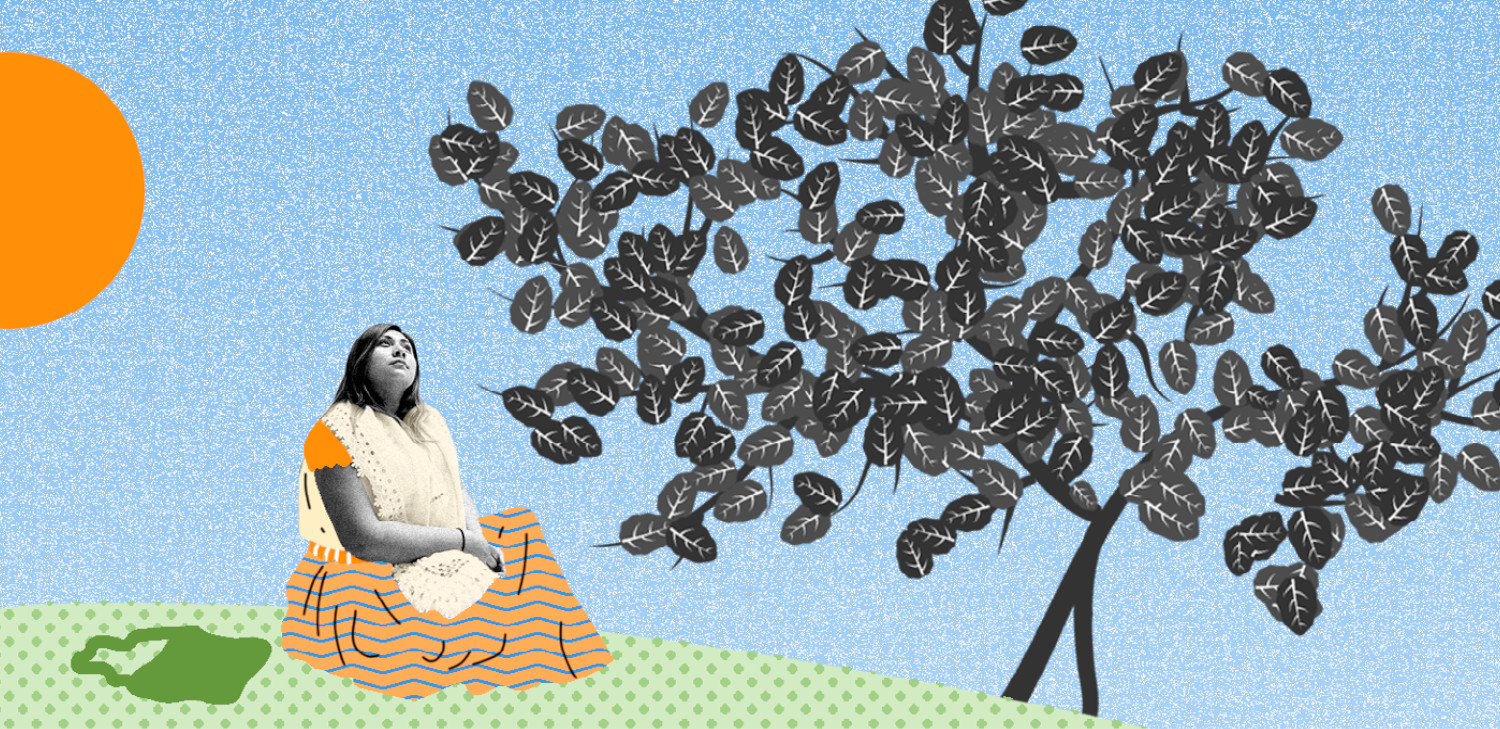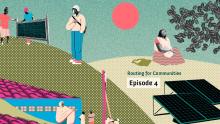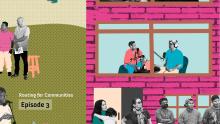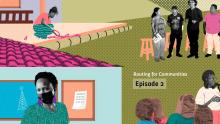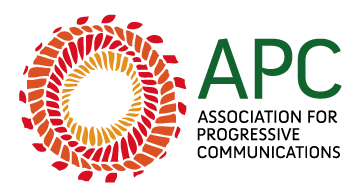#3 Wiki Katat: The first Indigenous virtual operator in Mexico
Come with us on a journey to meet the “Wiki Katat”, the first indigenous virtual operator providing internet and mobile phone services in Mexico. In this episode, you will get to know Flor Lino, who is part of the Wiki Katat and also of a community indigenous radio station in the country. You will also meet Lilian Chamorro, who works in many organisations linked to the topic of community networks in Latin America.
“Routing for Communities” is a twelve-episode podcast that presents community-led experiences that have come up with solutions to overcome the challenges of digital inclusion in remote, rural, and urban areas across the globe.
Stories and voices that are intertwined, connected by one thread: building internet and communication community networks.
In this podcast, you are going to listen to life stories of those who build innovative and bold community-led projects to connect the third of humankind that is still living offline.
Hello! My name is Renata Porto. I’m from Brazil, and I will follow you along this twelve-episode season.
By the song opening our episode, you must already be thinking the country we’ll first travel to today, right?
Yes! Today I will present to you an experience straight from Mexico: the “Wiki Katat”, the first indigenous virtual operator providing internet and mobile phone services in the country.
“I'm sure that for many women, it's not that we don't want to use technology, it's that sometimes we don't have the resources.”
“How these processes of Community communication, with a community network, can contribute to these life projects, or common dreams shared in the territory.”
In today’s episode, you will get to know Flor Lino, who is part of the Wiki Katat and also of a community indigenous radio station in Mexico. You will also meet Lilian Chamorro, who works in many organisations linked to the topic of community networks in Latin America.
“The Tosepan Titataniske co-op launched Wiki Katat, the first virtual operator managed by indigenous communities, offering telephone and internet services with prices starting at 50 pesos, and connects the inhabitants of Sierra Norte de Puebla and Sur de Veracruz, once companies like Telmex, Movistar, and AT&T did not want to provide them with services, claiming it was not profitable”.
You just listened to a piece from the News outlet SIN EMBARGO, that talks about Wiki Katat. This is a pioneer operator in Mexico, providing indigenous communities mobile and internet access.
You must be wondering, what does “Wiki Katat” mean? Well, the name comes from the Náhuatl and Totonaco Indigenous languages and it means “come, come”. In other words, it is an invitation for the communities to be part of a cooperative and collective communications’ process.
The Wiki Katat unites the work and aspirations of indigenous communities and represents a step towards technological autonomy.
For a better understanding of how everything started, and the characteristics of the region where Wiki Katat was founded, we talked to Flor Lino by video call.
Flor is Mexican, from the Masewal People and a member of the collective responsible for Wiki Katat: the Tosepan Union of Co-ops. She also works at Tosepan Limakxtum, the organisation’s radio station.
“Well, hello, my name is Floriberta Lino de Jesús. I am from a community called Tepetzalan, in the state of Puebla, Mexico. I am a proudly indigenous woman.”
Flor tells us that her community – Tepetzalan – means “cerro del medio [middle hill]” in her mother language, the “Náhuatl” [pronunciation: nah-oo-a-tz]. The rural community where she lives is located 12 kilometres away from the municipality of Cuetzalán, in the state of Puebla, which is in the Central Mexican Plateau.
Tepetzalan is a very small community; around 400 inhabitants. The whole town has a little over four thousand people. To help us meet their reality, Flor describes the typical clothing worn by the indigenous peoples.
“Well, if there is something that identifies us a lot is that, when you arrive in Cuetzalán, the men wear blanket pants, a shirt and their backpack, which is our 'taewaloni'; and the women carry their flowered sash, wear a long white skirt and a work shirt, which is woven by artisan hands in patterns of different flowers and different animals that exist in the region”.
Cuetzalán is part of the Mexican touristic route called “Magical Towns” [Pueblos Mágicos].
“Well, Cuetzalán is a magical town. They say it is magical because it has many waterfalls, hills, and Cuetzalán is green, there is a lot of vegetation. It has a wealth of flora and fauna. Normally, whenever someone comes to visit Cuetzalán, I always tell them: 'Don't stay in Central Cuetzalán, go to the communities, because that's where the good stuff really is.' I am talking about communities, because it is a rural area, there are paths, there is a cornfield, there is coffee, creeks and waterfalls. And the roosters usually wake you up in the morning, but also the morning birds, because they start tweeting at five in the morning. When the sun rises, they already wake you up, you don't even need an alarm.”
The Tosepan Union of Co-ops comes from over four decades of struggles and collective work. It amounts to over 40,000 indigenous families in more than 30 municipalities in the country, who work in areas such as organic production (mainly of coffee, pepper and honey), microcredit, alternative tourism, healthcare, and community communication.
Wiki Katat launch in 2022 was a milestone for the Union’s forty-fifth anniversary. The goal was to build Information and Communications Technologies in a way to contribute to the construction of Yeknemelis in the Masehual language, which means “buen vivir” in Spanish, or “good living” in english. “Buen vivir” is a concept that mobilises various Latin-American native peoples and is an alternative to Western models of development and progress. The Yeknemelis understands that it is necessary to prioritise the harmony between nature and humankind, having, as a guide, principles of social peace, solidarity, work, humility, and unity.
To explain how Wiki Katat came into being, Flor told us about the time she worked at the community radio station Tosepan Limakxtum. The joy of being able to work at the station, sharing with the communities, moved her as well as other young people to keep studying and contributing to the region. But an event interrupted the programming, not just in that small Mexican town, but in the whole world.
“Breaking News in México, where this morning that country is confirming two cases of coronavirus. Health officials say one of the patients is from Mexican City and the other is from the Northeast state of Sinaloa”.
The Covid-19 pandemic hit Mexico and other Latin American countries like a storm in the first semester of 2020.
“The pandemic arrives and we were worried because there is something that began to happen a lot, which is that the children were not studying. And that education was no longer free because now, to have access to classes, you have to recharge 50 pesos or 100 pesos, and those 100 pesos were meant for a kilo of sugar, they were for a kilo of beans. We have to start creating a social enterprise that would make us sustainable, thought of in our territory and strengthening the social and solidarity economy of the communities. That was when our dream of having a community mobile operator was born, which is Wiki Kakat”.
From then on, a group of seven young indigenous people who worked at the radio station started to take part in workshops, to develop a project and to have meetings with Altán Redes. Altán Redes is a public-private Mexican company, having the state as its major shareholder, responsible for the Mexican shared telecom network.
Altán works like this: it makes it available, on the wholesale market, the possibility for other companies or associations to offer telephone and internet services for retail consumers under a specific brand name using the country’s infrastructure. And this was precisely what Wiki Katat was looking for.
The search for an alternative for internet access in Mexico is also the result of a concentrated telecom system. The major cellphone companies in the country control about 97% of the sector. Under a profit’s logic, these companies do not offer services for many rural or impoverished areas.
Despite the need, there was a barrier to the creation of a non-profit indigenous operator in Mexico: lack of resources to establish a partnership with Altán Redes and finally being able to operate. That is when these young people saw an open call from the Local Networks initiative and decided to participate.
“We began to look at the form and to fill it out then, and everyone contributing ideas between our network partners, and Adri told us: 'This is the good one, this is the good one to get Wiki Katat'. And we would said: 'Yes, yes' – and we crossed our fingers – 'hopefully and yes, hopefully and yes'. So, I remember very well, when Adri arrived later and told me: 'I’ve already received an email and we went on to the second phase'. And then to the third phase and that was when we saw the sun, and we were happy. From here, from the Tosepan Union of Co-ops and from the Council, we said: yes, the agreement is going to be signed. Yes, we are going to be a virtual, social and community mobile operator. Yes, there is Wiki Katat”.
And this is how Wiki Katat was born.
Today, they offer cell phone and mobile internet services in many different plans at low cost. Aside from Puebla and Veracruz, the carrier is present in other Mexican states, such as Chiapas, Oaxaca, and Michoacán, besides Mexico City. It also intends to reach other communities.
In these places, it is possible to access services through their own operator and buy mobile chips, but the service works in the entire national territory. In the areas of the country where their operator is not present, Wiki Katat uses a remote connection, through roaming, in Altán’s shared 4.5G network to keep offering its services.
Wiki Katat also has a server for its users in which videos and photos are stored alongside other materials produced by the communities on their festivities, traditions, dances, corn growth, coffee and pepper picking. Called Taewaloni, this communication service presents the perspectives of the communities in their own native languages. If you’re curious to check it out, we will add a link to their website on the description of this episode
From her own personal life story, Flor learned that it is possible to always keep on working for a better life.
“There is something that has touched me a lot. It is that, I know it happens here in the communities and among indigenous peoples, and I am talking about Cuetzalán, my territory, but I am also talking about all the indigenous communities in Mexico and all Latin American countries. I'm sure that for many women, it's not that we don't want to use technology, it's that sometimes we don't have the resources. Or it is not because we do not want to prepare ourselves and continue to prepare ourselves, to have more knowledge, because sometimes we live far from a university or far from having access to what the networks are, you know? And so that is why we at Tosepan Radio are thinking a lot about how to integrate new women, and that Wiki Katat and that the networks are just a way to meet other women and to become visible, and say that women can do it too”.
Lilian Chamorro Rojas is also part of Wiki Katat’s history. She is a telecom and electronic engineer who has worked for many years with community networks in Latin America through organisations such as Colnodo, in Colombia, and the Redes AC in Mexico.
We also talked to her in a video call. Lilian was in the town of Pupiales in Colombia.
Through her experience with community networks, Lilian highlights a fundamental aspect in these processes: the creation of shared dreams for the future.
“These are processes that each community names in a different way. In Colombia, one talks a lot in terms of life plans, especially in indigenous communities. It’s a process of collective construction, let’s say, where the community is gathered around bonfires, including sacred places, to talk about what is really important for them, about what they have to improve, their needs as a community. From there, new lines of work are established.”
She explains that no matter how they name it, a lot of communities have their collective dreams as common ground.
“Not all territories have clear life plans, written down, or somehow worked on. But even in territories where there is no clear elaborate life plan, one can still see if they have dreams in common, shared needs, and shared dreams. And such shared dreams, which end up becoming little strategies, little plans, start shaping the future and that’s our starting point, right? And from there on, we can start to see, well, how these processes of community communication or how a community network may contribute to these life plans and dreams that are shared in the territory.”
One of Wiki Katat’s fronts is strengthening cultural identity and the indigenous community’s cosmovision. What happened in Mexico is very common in other indigenous communities in Latin America.
“There are communication’s processes that take place in the territories and we also start to take into account how there are other technologies and other forms of communication, since these further strengthen and even expand the possibilities of being able to share local knowledge, of being able to sustain the identity of the territories, which are part of the life plans of many communities, you know? Let alone the strategies used by many communities. Because a lot of these life plans we find is that one of the major concerns, for example, is the loss of identity, or that the young generations will no longer be interested in the local knowledge, or in forms of knowledge that exist in the community. So, how can we make sure certain forms of knowledge are preserved and continue to be passed on? Well, it’s through communication that such task may be achieved in different ways, right? From the arts to new technologies, we are able to collect and gather histories, having all the information properly stored in digital media and also shared via the networks.”
And this is the end of our episode.
If you want to know more about Wiki Katat, look up their website, which we will post in the description of this episode.
If you’ve liked this episode, please recommend this podcast to those you know will appreciate it as well.
You can follow the season on the main podcast platforms or on APC’s website: routingforcommunities.apc.org. there you will also find materials to learn more about these experiences.
We’ll meet again soon, with new experiences and stories from community-led networks that are also connected to our lives.
Next episode, the fourth of the season, we will travel once again to South Africa. Over there, you will get to know more about Amadiba Community Network’s experience, located in the so-called Wild Coast. This story shows how access to the internet via community networks strengthens the fights for rights in a community in an abundantly luscious nature that has been threatened by titanium mining.
You listened to the third episode of “Routing for communities: An audio journey tracing community connectivity around the world”. This is the podcast of the Local Networks initiative, a collective effort led by APC and Rhizomatica. Production: Rádio Tertúlia.
In this episode, you have listened to audio content from KGET News.
Thanks and see you next time!
Credits
This podcast is an initiative from the Association for Progressive Communications (APC) and Rhizomatica, produced by Rádio Tertúlia.
Script, and production and voice-over support: Vivian Fernandes.
Presentation: Renata Porto.
Editing and voice-over support: Beatriz Pasqualino.
Sound: Lua Gatinoni.
Coordination: Beatriz Pasqualino and Débora Prado.
Consulting Board: Bruna Zanolli, Cynthia El Khoury, Daniela Bello, Flavia Fascendini, Kathleen Diga and Nils Brock.
Translation: Thiago Moyano.
Illustration: Gustavo Nascimento.
Web design: Avi Nash and Cathy Chen.
